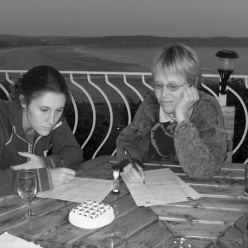22-25 May 2020
How the Light Gets in (HTLGI 2020), UK (ON-LINE)
Debate title: ‘Beyond Material’
13 May 2020
CEDIL – Centre for Evaluation, Lecture Series
Nancy Cartwright: ‘Ten steps towards the construction of a middle-level theory’
9 May 2020 – CANCELLED
Inaugual Kreps Symposium, Stanford, USA
29 April 2020 – CANCELLED
Ruth Barcan Marcus Memorial Lecture, Yale, USA
27 April 2020 – DELIVERED ON-LINE
Paper to The Aristotelian Society, London, UK
Nancy Cartwright: ‘Why Trust Science?’
16 April 2020 – CANCELLED
Lecture and Workshop, University of Siegen, Germany
Research Training Group Lecture and PhD Workshop, ‘Consequences of Social Services Work’
1 April 2020 – CANCELLED
CEDIL Lecture, London, UK
Nancy Cartwright: ‘Using causal-process-tracing middle-level theory to improve local predictions and planning for more effective interventions’
17 January 2020
Book Launch: ‘Nature, the Artful Modeler, UC San Diego, USA
A mini-workshop to celebrate Nancy Cartwright’s book, NATURE, THE ARTFUL MODELER
Nancy Cartwright: ‘In social services, Context matters is more than a slogan’
15 January 2020
Biomedical Ethics Seminar, UC San Diego, USA
Interdisciplinary workshop on possible trade-offs between epistemic values and use values
Nancy Cartwright: ‘Where morals & methods mix — & not always for the best’
5 December 2019
St. Andrews Philosophy Society Talk, University of St. Andrews, UK
Nancy Cartwright: ‘Big – resplendent – theory: the Meccano set of science’
4 December 2019
Joint Event with Michela Massimi, Edinburgh, UK
ERC Consolidator Grant holder: “Perspectival Realism. Science, knowledge and truth from a human vantage point”
1-3 December 2019
Annual Lecture in ‘Philosophy and the Sciences’, University of Oslo, Norway
Nancy Cartwright: ‘Evidence and the Demands of Rigor’
14-15 November 2019
Bielefeld University: 50th Anniversary Conference, Bielefeld, Germany
Opening Keynote Lecture: ‘Why Big Theories are Here to Stay’
28 October – 1 November 2019
Thalheimer Lectures, John Hopkins University, Baltimore, USA
Series Title: ‘Why Trust Science’
Lecture 1 – ‘The usual suspects: rigor, method, objectivity’
Lecture 2 – ‘Nest-building: how the tangle of practice makes for good science’
Lecture 3 – ‘Penicillin, boiling, and the democratic peace’
11 October 2019
K4U Workshop on ‘Values’, Durham, UK
10 October 2019
Workshop: ‘Evidence in Education Practice’ Durham, UK
14-15 June 2019
Conference in Honour of David Knight, Durham, UK
Nancy Cartwright: ‘Trust in Science’
11 June 2019
CRAASH: The Politics of Economics Seminar Series, University of Cambridge
Talk title: ‘Evidence for Policy Prediction: Intervention-centred or Context-centred?’
5 June 2019
CEDIL-CfE Lecture , London
Nancy Cartwright: ‘Evidence for Action in New Settings: The importance of middle-level theory’
4 June 2019
Big Evidence Debate, Durham University Business School
Panel Discussion: ‘Is meta-analysis the best we can do? A critical discussion of the best approaches to synthesising research findings’
Professor Steve Higgins, Professor Nancy Cartwright,Professor Catherine Hewitt and Ben Styles
29 May 2019
SKAPE Keynote Lecture, School of Social & Political Science, University of Edinburgh
‘The Intervention-centred versus the Context-centred Approach to EBP’
27 May 2019
HowTheLightGetsIn 2019, Hay-on-Wye
Nancy Cartwright: ‘Science: Why trust it? ‘
20 May 2019
UCL Philosophy Society, London
Nancy Cartwright: ‘Scientific laws and predictive models: Building birds nests from a handful of sticks’
10 May 2019
Evidence Amalgamation Workshop, Cork, Ireland
3 May 2019
Jowett Society Lecture Series, Faculty of Philosophy, University of Oxford
Nancy Cartwright: ‘Nature the Artful Modeler’
2 May 2019
Royal Society and British Academy Workshop on Narratives and Science, London
11-12 April 2019
Colloquium for Brigitte Falkenburg, Dortmund
Nancy Cartwright: ‘In defence of physics as an instrument’
21-23 February 2019
(Rearranged) 2017 Lebowitz Prize Session with Elliott Sober, 2019 APA Central Division meeting, Denver, Colorado
Elliott Sober: ‘The Scientific Method – Methods that aren’t Subject-Specific’
Nancy Cartwright: ‘The Scientific Method – The Devil is always in the Details’
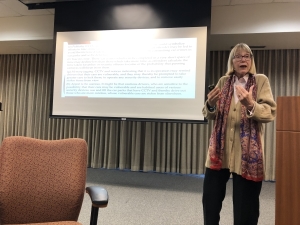 20 February 2010
20 February 2010
Philosophy Department Lecture, California State University Northridge
Nancy Cartwright: ‘Middle-level theory: Without it what could anyone do?’
27-29 November 2018
[K4U] Workshop, Università Ca’ Foscari, Venice
A central unifying theme across K4U is: ‘structure’. One of K4U’s aims now is to explore better methods of understanding how underlying structures, systems and contexts influence outcomes.
13-16 November 2018
Raimundus Lullius Lectures on Logic, Methodology and Philosophy of Science, Madrid
Lecture 1: 13th November: Markers, mechanisms and measures
Lecture 2: 14th November: Causal-chain models and theories of change
Lecture 3: 16th November: Mechanisms and mid-level laws
1-4 November 2018
PSA 2018, Seattle
Medical Scepticism symposium. ‘No-no to singular causation: Healthy scepticism?’
26 October 2018
Workshop: Structural and Organisational Change, LSE, London
24-25 September 2018
Transforming the field: Use of Research Evidence in Policy and Practice, Nuffield Foundation, London
Panel and workshop, theme 3: Measuring, theorising and unpacking ‘use’ (Prof Kat Smith, Prof Nancy Cartwright, Prof Justin Parkhurst)
5-6 September 2018
The Lauener symposium , Haus der Universität, Bern, Switzerland
Talk title: ‘The Argument Theory of Evidence: A Foundation for Voluntarism’
21-23 August 2018
Conference of the mixed methods international research association, Vienna
Keynote speech on 22 August: Title: ‘First mix the claims; then mix the methods.’
3-4 July 2018
ESRC National Centre for Research Methods Festival, University of Bath
Keynote talk title: ‘Causal inference: Evidence for the single case?’
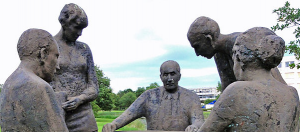 27 June 2018
27 June 2018
K4U Deliberation Workshop
Researchers from the Knowledge for Use (K4U) project held this workshop at Newcastle University
7 June 2018
Department for Social Policy and Intervention Seminar Series, University of Oxford
Talk title: ‘Evidence for Policy Prediction: Intervention-centred or Context-centred’
29 May 2018
Inaugural Departmental Lecture Series, The Great Chamber, University of Lincoln
Talk title: ‘Evidence-based Policy: Where Philosophy Meets Practice’
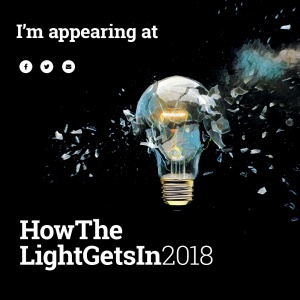
26 May 2018
HowTheLightGetsIn 2018, Hay-on-Wye, UK
Debate title: ‘The Edge of Reality’
17-19 May 2018
SWIP Ireland’s annual conference, Dublin
Talk title: ‘What’s with scientific method? What’s with rigour?’
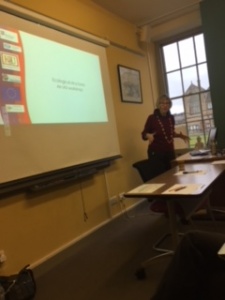 CHESS/IAS/K4U Workshop Series: 2017-2018 Thinking Ecologically about Policy and Structure. The Institute of Advanced Study (IAS) at Durham University had a theme of ‘structure’ for 2017-8. Nancy Cartwright and Hakan Seckinelgin of the LSE organised two workshops which were jointly funded by K4U the IAS. The first of these workshops took place on 31 October 2017 and looked at the philosophical foundations of ecological structure as an explanatory mechanism. The second workshop, Two approaches to mapping social structure? (Systems theory; Ecology) took place on 15 May 2018.
CHESS/IAS/K4U Workshop Series: 2017-2018 Thinking Ecologically about Policy and Structure. The Institute of Advanced Study (IAS) at Durham University had a theme of ‘structure’ for 2017-8. Nancy Cartwright and Hakan Seckinelgin of the LSE organised two workshops which were jointly funded by K4U the IAS. The first of these workshops took place on 31 October 2017 and looked at the philosophical foundations of ecological structure as an explanatory mechanism. The second workshop, Two approaches to mapping social structure? (Systems theory; Ecology) took place on 15 May 2018.
15 May 2018
Thinking Ecologically about Policy and Structure, Workshop Two, Institute of Advanced Study, Durham University, UK
Two approaches to mapping social structure? (Systems theory; Ecology)
11 May 2018
2018 Human Welfare Conference, Green Templeton College, Oxford University
Round table moderator: ‘Exploring Validity: Questioning the idea of evidence’
18 April 2018
Goldsmith’s Economics Seminar Series, University of London
Talk title: ‘The Limitations of RCTs in Economics’
23 March 2018
Salmon Memorial Lecture, University of Pittsburgh
Nancy Cartwright, ‘Causal Processes & Causal Interactions: Warranting Causation in the Single Case’.
5 March 2018
UCSD Science Studies Talk (on RCTs)
Title: ‘What’s wrong with pragmatic trials?’
9 February 2018
UC Davis Colloquium
Title: ‘Is the cat really lapping up the milk?’
A discussion between Nancy Cartwright and Bas van Fraassen
2 February 2018
PHI BETA KAPPA Society, Lebowitz Lecture
University of Wisconsin–Madison, Philosophy Department Colloquium
Elliott Sober, ‘The Scientific Method – Methods that aren’t Subject-Specific’
Nancy Cartwright, ‘The Scientific Method – The Devil is always in the Details’
2 February 2018
Philosophy Department Colloquium, University of Wisconsin–Madison
Title: ‘What do educators need to know?’
24 January 2018
UC Riverside’s Colloquium, University of California at Riverside
Title: ‘What is wrong with the idea of the scientific method?’
31 October 2017
Thinking Ecologically about Policy and Structure, Workshop One, Institute of Advanced Study, Durham University, UK
Learning how to affect change in stable structures
24 October 2017
SMSC Lecture, St. Mary’s College, Durham University, UK
Prof. Cartwright delivered a talk to College alumni entitled “Evidence and Policy: Why ‘What Works’ Doesn’t Work’ 3
3-4 October 2017
The Guidelines Challenge: Philosophy, Practice, Policy – A CauseHealth Event, Oxford, UK
Prof. Cartwright delivered a keynote lecture entitled ‘What evidence should Guidelines take note of?’
Abstract: I suppose that guidelines are supposed to help choose a safe, effective, reasonable-cost, tolerable and culturally and morally acceptable treatment for an individual patient. In which case, there are no general answers to the title question – and that includes RCTs and pragmatic trials. RCTs, like any study, can only warrant results about the population studied and then essentially only estimates of average treatment effects in that population. For RCT results to be useful for predictions about individuals, even if they are individuals in the trial itself, much more evidence, very different in kind, must be consulted. Without such information, RCT results have very little, if any, evidential value for the individual. This paper will outline other kinds of information that can promote the evidential value of the RCT and also ideas about how to build good individual predictions without an RCT.
